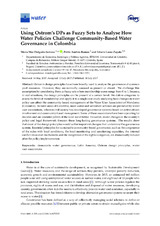Using Ostrom’s DPs as Fuzzy Sets to Analyse How Water Policies Challenge Community-BasedWater Governance in Colombia
Autor
Ramos, Pablo
Zapata, Edwin Lasso
Delgado Serrano, María del Mar
Editor
MDPIFecha
2017Materia
Democratic water governanceLatin America
Ostrom design principles
Water user associations
METS:
Mostrar el registro METSPREMIS:
Mostrar el registro PREMISMetadatos
Mostrar el registro completo del ítemResumen
Ostrom’s design principles have been broadly used to analyse the governance of common
pool resources. However, they are normally assessed as present or absent. We challenge this
assumption by considering them as fuzzy sets where membership scores range from 0 to 1, because,
in real situations, the design principles can be present at a certain level. We define categories to
assess the level of membership and apply it to a single case study analysing how changes in water
policy can affect the community-based management of the Water User Association of Mondomo
(Colombia). In rural areas of Colombia, most water and sanitation services are provided by water
user associations, wherein civil society has developed governance systems based on active citizen
involvement and community-based management. Some of these associations have been operating for
decades and are essential pillars of the local social fabric. However, recent changes in the country’s
policy and legal framework threaten these long-lasting governance systems. The results show
that most of the design principles would suffer important changes that undermine the governance
system. Essential principles for sustainable community-based governance, such as the congruence
of the rules with local conditions, the local monitoring and sanctioning capacities, the internal
conflict-resolution mechanisms and the recognition of the rights to organize, are dramatically reduced
after the policy implementation.

